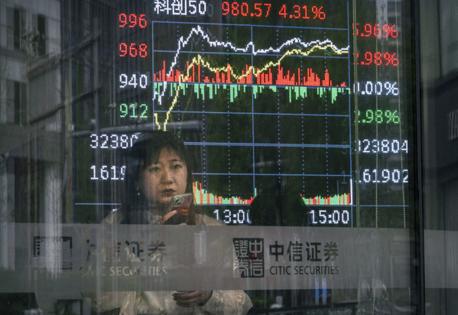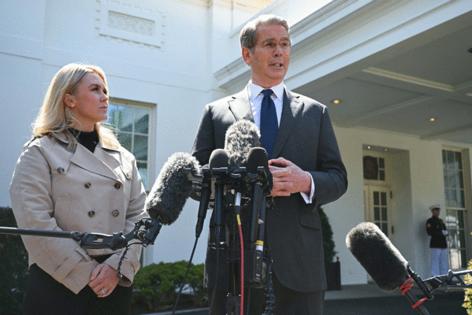Trump halts higher tariffs on most nations, ups China rate
Published in Political News
WASHINGTON — President Donald Trump announced a 90-day pause on higher reciprocal tariffs that hit dozens of trade partners after midnight, while raising duties on China to 125%.
The president’s about-face comes roughly 13 hours after higher reciprocal duties on 56 nations and the European Union took effect, fueling market turmoil and stoking recession fears. Trump came under massive pressure from business leaders and investors to reverse course.
“I thought that people were jumping a little bit out of line,” Trump told reporters at the White House on Wednesday when asked why he backed off. “They were getting a little bit yippy, a little bit afraid.”
Stocks surged the most since 2020 on Trump’s abrupt announcement, with the S&P 500 Index rising over 8%, with almost every company gaining, and the tech-heavy Nasdaq 100 jumping the most since 2008. Goldman Sachs Group Inc. economists rescinded their forecast for a U.S. recession.
Bonds eased an earlier selloff but remained down across maturities for a third day. Trump was looking at the bond market as he made his decision, he told reporters.
“The bond market is very tricky,” the president said. “I was watching it. But if you look at it now, it’s beautiful — the bond market right now. But I saw last night where people were getting a little queasy.”
Countries that were hit with the higher, reciprocal duties that went into effect Wednesday will now be taxed at the earlier 10% baseline rate applied to other nations, with the exception of China, according to a White House official. Trump said on social media that more than 75 countries had contacted his administration to negotiate on trade barriers and “have not, at my strong suggestion, retaliated in any way, shape, or form.”
“I have authorized a 90 day PAUSE, and a substantially lowered Reciprocal Tariff during this period, of 10%, also effective immediately,” Trump posted on his social media site.
The president also said he is “going to take a look at” tariff exemptions for some U.S. companies and will decide “on instinct.”
“Some companies, through no fault of their own, happen to be in an industry that’s more affected. You have to be able to show a little flexibility, and I’m able to do that,” Trump said.
Trump’s decision to raise import taxes even further on China came after Beijing announced plans to retaliate with an 84% duty on American goods set to begin Thursday. The Trump administration has taken particular aim at China over its trade practices and its combative approach to the president’s tariff plans.
“Based on the lack of respect that China has shown to the World’s Markets, I am hereby raising the Tariff charged to China by the United States of America to 125%, effective immediately,” Trump said in a social media post.
The president later Wednesday predicted Chinese President Xi Jinping or his team would come to the table for negotiations despite their defiant posture.
“President Xi is a proud man I know very well. And they don’t know quite how to go about it, but they’ll figure it out in the process of figuring out. But they want to make a deal,” he said.
Trump cast his sweeping tariffs as a powerful tool to revive domestic manufacturing and grow the U.S. economy, promising new factories and jobs in America. Yet the rapid shift in strategy raises questions about whether that remains the president’s goal and how he plans to achieve it.
Treasury Secretary Scott Bessent on Wednesday couched the turnabout as a victory for Trump, telling reporters the president “created maximum negotiating leverage for himself” in talks with other nations. He said he would be speaking to officials from Vietnam, Japan, India and South Korea in the coming days.
“It took great courage for him to stay the course until this moment,” Bessent said at the White House. “This was his strategy all along.”
Billionaire investor Bill Ackman, a recent convert to Trump’s cause, on Sunday called for a three-month “time out” from the higher rates, which he warned could result in a “self-induced, economic nuclear winter.”
“By placing massive and disproportionate tariffs on our friends and our enemies alike and thereby launching a global economic war against the whole world at once, we are in the process of destroying confidence in our country as a trading partner, as a place to do business, and as a market to invest capital,” Ackman said.
Trump and his allies for days ahead of his announcement denied they were considering a blanket pause before the reciprocal tariffs were implemented. Top White House economic adviser Kevin Hassett was asked about the possibility Monday during an interview with Fox News, and deferred to “what the president is going to decide.” But when social media posts suggesting Trump was considering such a pause drove a market rally, the White House decried the reports — which erroneously cited Hassett — as “fake news.”
Bessent said the president’s decision “signals that President Trump cares about trade and that we want to negotiate in good faith” and described the previously announced reciprocal duties as the “maximum level” for U.S. tariffs.
Commodity and energy markets also moved rapidly higher after the president announced his decision, including copper futures, Arabica coffee and natural gas. Bitcoin also rocketed. Soybean futures lagged other markets, indicative of prolonged uncertainty about U.S.-China trade.
Hours before announcing the pause, Trump urged investors on social media to “BE COOL,” saying “THIS IS A GREAT TIME TO BUY” and predicted “everything is going to work out well.”
U.S. Trade Representative Jamieson Greer, testifying before a House panel when news of Trump’s announcement hit, told lawmakers he was aware that a pause was under discussion minutes beforehand.
Democratic Rep. Steven Horsford berated Greer, saying the president’s maneuver was “market manipulation” to benefit billionaire investors.
“Who is in charge? Because it sure doesn’t look like the trade representative,” the Nevada lawmaker said. “You just got the rug pulled out from under you.”
Greer denied that the president was manipulating markets. The White House did not immediately respond to a request for comment about Horsford’s remarks.
_____
(With assistance from Alicia Diaz and Laura Davison.)
©2025 Bloomberg L.P. Visit bloomberg.com. Distributed by Tribune Content Agency, LLC.































































Comments